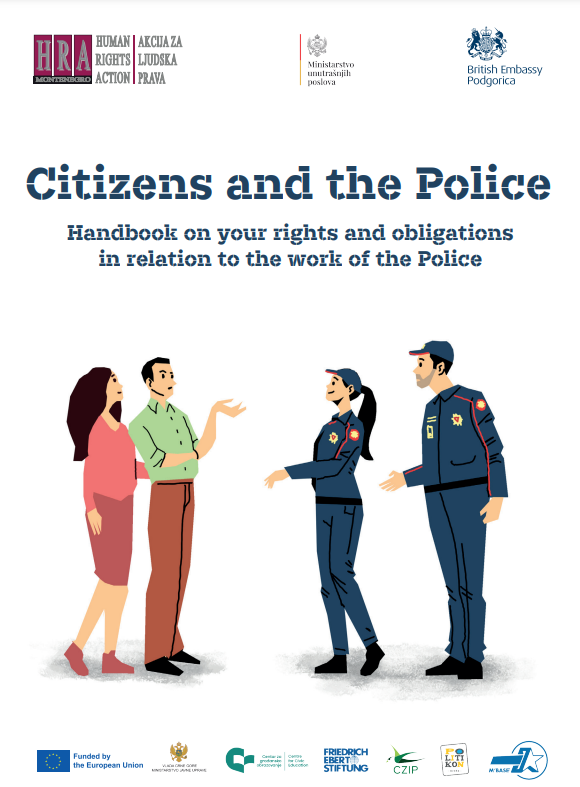
Citizens and the Police – Handbook on your rights and obligations in relation to the work of the Police
08/07/2024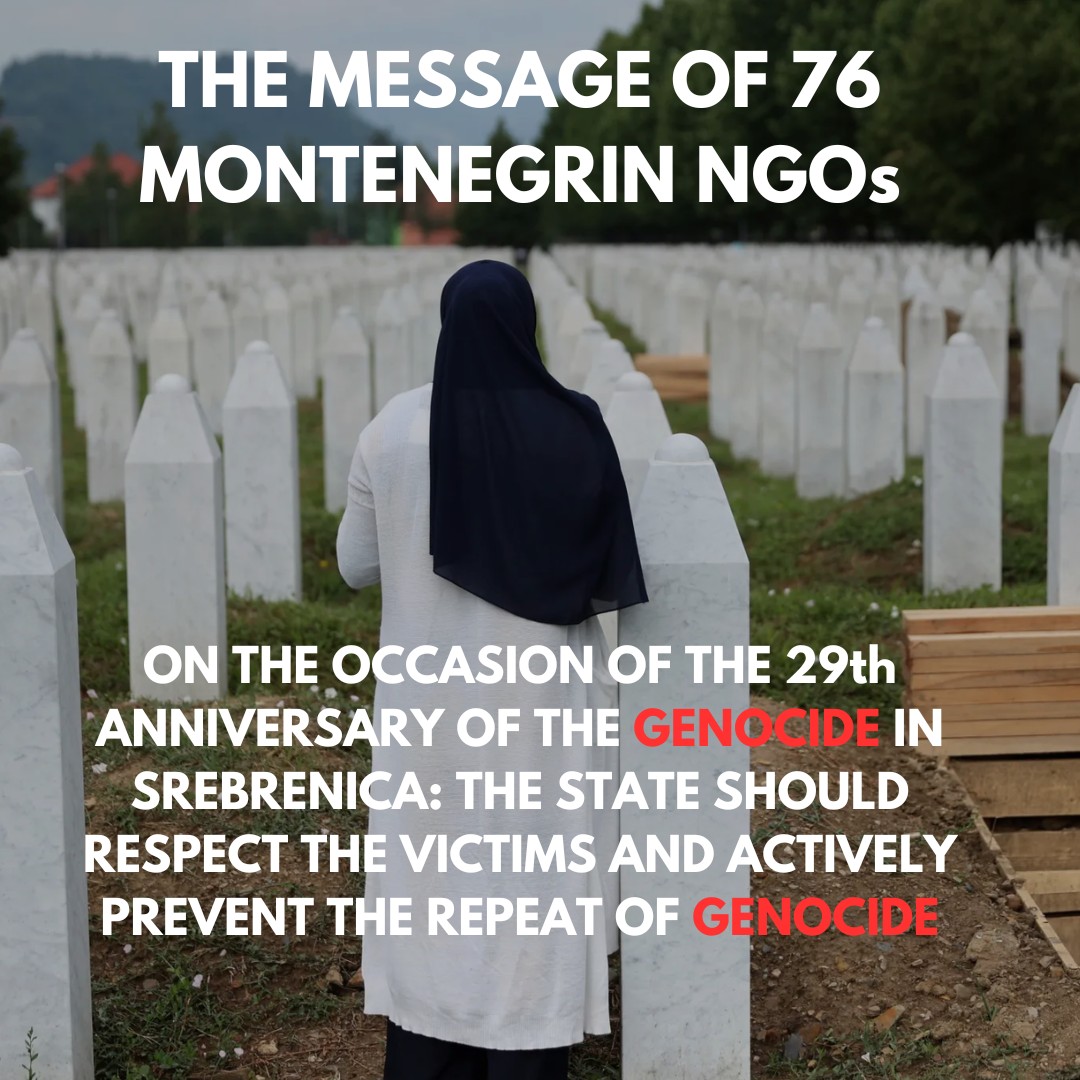
THE MESSAGE OF 76 MONTENEGRIN NGOs ON THE OCCASION OF THE 29th ANNIVERSARY OF THE GENOCIDE IN SREBRENICA: THE STATE SHOULD RESPECT THE VICTIMS AND ACTIVELY PREVENT THE REPEAT OF GENOCIDE
10/07/2024COMMEMORATIVE GATHERING ON ‘GOLI OTOK’ – 75 YEARS SINCE THE ARRIVAL OF THE FIRST PRISONERS
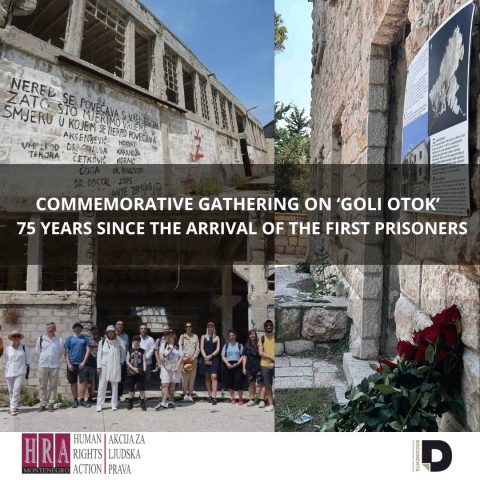
Yesterday, the Centre for Dealing with the Past Documenta from Zagreb and the Human Rights Action from Podgorica organised a commemorative gathering on the island of Goli Otok, on the occasion of the 75th anniversary of the arrival of the first prisoners in this camp.
The purpose of the gathering was to show respect for the thousands of victims who were subjected to mental and physical torture on Goli Otok, Sveti Grgur and in other camps for the re-education of political prisoners. Also, we wanted to draw attention to the significance of facing the facts about those camps, to which people were brought without a fair trial. The goal was also to reiterate the importance of protecting human rights to freedom of thought and expression, to a fair trial and the prohibition of torture, to prevent similar inhuman horrors perpetrated by the state from ever happening again.
The commemoration was attended by representatives of six families of inmates from Montenegro, president of the Croatian Goli Otok Association “Ante Zemljar”, Darko Bavoljak, historian Branimir Janković from the Faculty of Philosophy in Zagreb, the directors of Documenta and Human Rights Action, as well as a group of young participants of the photography workshop as part of the European project entitled “(In)visible Traces”. The participants of the gathering said that Goli Otok should be turned into an island of remembrance, education, and educational tourism suitable for such a place.
From 1949 to 1956, Goli Otok served as a camp for real and alleged supporters of Stalin. Prisoners were sent to it without a fair trial, often based only on suspicion and without any real evidence. The conditions in the camp were inhumane and inmates experienced brutal psychophysical violence, thirst, hunger and disease. It is estimated that at least 300 people died on the island.
“This is the place where people used to pass between lines of other inmates who were forced to beat them. They survived torture here. This is where women and men experienced violence from their friends. Today, we came here from Croatia, Montenegro, Italy, Germany and Greece. This is a place of remembrance for all of us from post-Yugoslav countries, as well as from Europe. It has also become a place of learning. We want to remember these people’s suffering, but we also want to say NO to any sort of political violence. We want to say NO to all suffering”, said Vesna Teršelić, leader of Documenta.
Documenta is warning once again that the complex in which the political opponents of the former regime were imprisoned has been deteriorating for decades. It is a shame that Goli otok and Sveti Grgur are not yet protected as important parts of the cultural heritage, not only of the Republic of Croatia, but of the world as well. The decision on preventive protection by the Conservation Department in Rijeka of the Administration for the Protection of Cultural Heritage was made in 2016. We are calling on the Administration and the Ministry of Culture and Media to publicly say what – if anything – has been done since 2016 to permanently protect the prison complex.
“Today, from this sad place to which the first group of inmates arrived 75 years ago, the Goli Otok Association “Ante Zemljar” wants to send a message to all those who want to turn this place into a culture of oblivion, that it is the task of all of us to make this place a culture of remembrance, so that we can heal the wounds of the past and create a healthier present and future, relieved of the weight of the past”, said Darko Bavoljak, president of the Association.
After returning from Goli otok, the former prisoners were followed and, most often, could not get a job or advance in their careers, while their families were permanently marked by their camp experiences. Among the estimated 13,100 prisoners, more than 3,000 were from Montenegro, which was by far the most compared to the number of inhabitants.
The father of Miodrag Iličković, a former judge of the Constitutional Court and a deputy of the National Assembly of Montenegro, was arrested in the capacity of assistant minister of the Government of Montenegro and spent three years in “Petrova rupa” [Peter’s hole]. His uncle spent two years in “Velika žica” [Great wire].
“The family, who lived in Cetinje, was persecuted, punished and imprisoned. After returning from Goli Otok, my father was not entitled to a salary for two years. It was only later that he was given the right to a job and a normal life. But I think it’s important that they left the Island with their heads held high. They did not do anything bad to their comrades, to other convicts here. And it is very important that they did not teach us to hate, considering all they had to go through, that they did not turn us into haters”, said Iličković.
Unlike other countries – former Yugoslav republics, Montenegro did by far the least for the victims of the terror of Goli Otok. Serbia, Croatia and Slovenia have passed laws that rehabilitated former political prisoners and awarded compensation for damages to them and their families. In 2003, Slovenia offered the former inhabitants of Goli Otok 6,300 euros for each year they spent on the island, while Croatia and Serbia paid them approximately 7 euros for each day they spent there.
Executive Director of the Human Rights Action, Tea Gorjanc Prelević, said that no one deserved the torture that was suffered by those who spent time on Goli Otok, or the treatment they received as ‘free’ people once they returned home.
“We have gathered here today to remind you of the crimes that people are capable of committing against each other. Today we are here because of the 13,000 people who were exposed to terrible violations of the prohibition of torture, violations of the right to a fair trial, violations of the right to freedom. We especially remember the 3,300 inmates from Montenegro who were sent here. At the same time, Montenegro is the only country that does not have a law on the rehabilitation and compensation of victims of the terror of Goli Otok, and we are still fighting for it”, said Gorjanc Prelević.
The HRA reminds that the previous authorities did not accept the initiative for the adoption of the Law on Rehabilitation and Compensation of Victims of Political Persecution – Male and Female Inmates from Goli Otok, Sveti Grgur and Other Prisons, thus continuing to disrespect the rights of victims from Goli Otok and their families.
We are appealing to the Government of Montenegro and people’s deputies to reconsider the urgent need to pass the law on the rehabilitation and compensation of the victims from Goli Otok, so that the few who are still alive and the descendants of those that passed away can get the satisfaction they deserve.







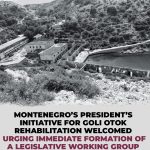



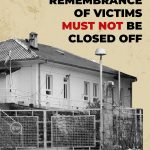
 English
English Montenegrin
Montenegrin